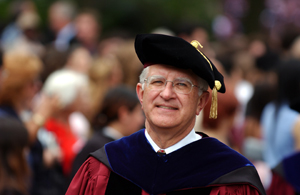|
||
      |
Transition time
As Don M. Randel heads to the Mellon Foundation, the board of trustees prepares to hire the University’s 13th president.
Jim Crown has cast a wide net. The chair of the University’s board of trustees has enlisted fellow trustees, faculty, friends, and alumni (see “Letters”) for suggestions on Chicago’s next president. “At first blush I’d rather be overinclusive,” he says in late August, four weeks after Don Randel announced that after six years at the helm, next summer he’ll become president of the Andrew W. Mellon Foundation in New York City.

Randel at this year’s convocation.
The decision to leave Chicago wasn’t easy. “It was wholly unexpected,” Randel says. “I had no notion that I would ever leave this University, or this city for that matter.” But when the Mellon Foundation asked him in July to take its presidency, “I was obliged to think about a number of things.” For two weeks he considered his options. “It was painful,” he says. “I did not come to a conclusion until the day I had to tell them.” Of all the major foundations, he explains, Mellon “is the one I’ve most admired, the least bureaucratic, and the most committed to things I have worked on all my life,” such as supporting the humanities and liberal education. There he would influence several institutions’ futures, distributing funding rather than asking for it. Randel turns 65 this year, so, he says, “if I was ever going to make a career change, now would be the time to do it.” At Chicago he’d likely step down in three years, at the end of the current capital campaign, while “at Mellon I’d have maybe another seven years of a professional life.”
Randel also had to consider the implications of leaving in the middle of the Chicago Initiative, the University’s $2 billion capital campaign. In a way, he says, the campaign may be better off. “We just finished arguably the most successful fund-raising year ever”—bringing in $217 million—“the trajectory is good, the base is solid,” he says. “There is time for a new president to come in and influence the way it goes in the future, which is somewhat better than me raising all the money and setting all the priorities.”
While the new president will set campus and fund-raising priorities, Crown notes, he or she also will have other responsibilities. The chosen candidate must be “capable of administering a large institution, including a medical center,” and able to help “nurture the relationship and plans for” Argonne National Laboratory. And in addition to having fund-raising experience and the ability to represent the University well, the new president must be someone the faculty respect, Crown says, who has “an appropriate level of accomplishment as a scholar.”
To find Randel’s successor, Crown chairs the trustee search committee, which was scheduled to meet after Labor Day. Its first goal, he says, is to “make sure we’re all aligned as to the understanding of our task, including setting a job description.” The committee, made up of ten trustees and former board chair Ned Jannotta, will consider the names generated by the campus community and decide “who to investigate further.” The 51 elected faculty members on the Council of the University Senate, meanwhile, have voted on a seven-person team to advise the search committee. While the trustees make the final decision, Crown says, “we want to work closely with the faculty and rely on them for advice and due diligence.”
Once the search process starts, he admits, “we’ll be circumspect until it’s over.” Although there is no official deadline, he hopes to make a decision by the first quarter of 2006. “We’re always sorry to lose someone as talented as Don Randel,” says Crown, “but then we go out in the world and find someone.”